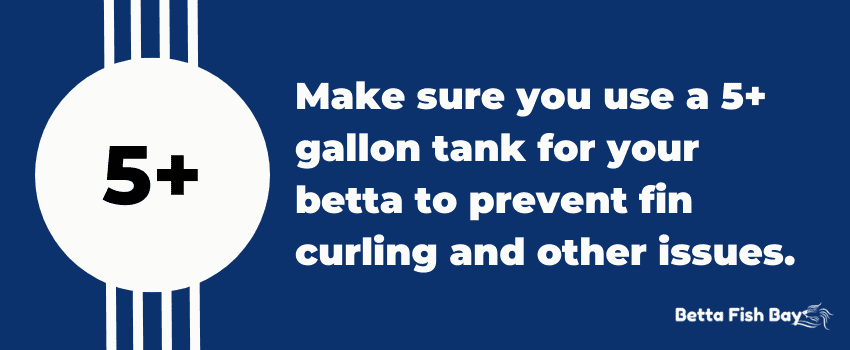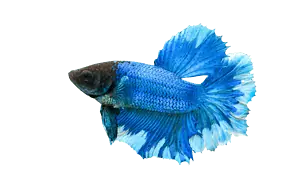Betta fish are prone to numerous diseases and parasitic infections.
This makes it critical to regularly monitor your bettas’ health and behavior.
One common disease among bettas is fin curling.
Betta fish fin curling refers to bettas’ fins having a curled or “rotted” appearance. It has many potential causes. These include fin rot, poor water quality, improper diet, and stress. Bettas need specific living conditions to thrive, and meeting these needs can help prevent fin curling in bettas.

Table of Contents
What Causes Betta Fish Fins to Curl?
Curled fins among betta fish have several potential causes.
The issue usually boils down to underlying disease, bad water quality, or stress in betta fish.
Additionally, injuries or genetic anomalies can result in curled fins.
Here are the most common factors contributing to betta fish fin curling.
Fin Rot
Fin rot is a common condition in betta fish, usually caused by bacterial infections. As the name suggests, it causes issues with the fins, such as the following:
- Curled fins
- Clamped fins
- Discoloration
- Tears in the fins
- Bleeding from the fins
- Lethargy
- Lack of appetite
To ensure a proper diagnosis, have your unwell betta examined by a certified vet.
Prevention
There are several ways to help prevent fin rot in your bettas.
Because fin rot is most often caused by bacterial infections, it’s crucial to keep the tank clean. Frequent water changes can help you achieve this.
Also, remove any uneaten food from the tank floor each day.
Feeding your bettas a healthy diet is another way to prevent fin rot. Bettas need food high in protein and fiber.
A well-balanced diet will keep their immune systems strong to fight bacterial infections.
Reducing stress in your bettas can help prevent fin rot. Stressed bettas are more prone to infections and disease.
Provide ample tank space, good water quality, and hiding places to help reduce stress.
Treatment
Improving water quality and tank conditions can help with treatment.
But you may need to give your bettas medication if the disease has progressed. Purchase an over-the-counter fin rot medication and follow the instructions on the packaging.
Another option is to give your infected betta an aquarium salt bath.
This method helps kill the bacteria causing the disease but is also risky.
Poor Water Quality

Another cause of curled fins is poor water quality or inappropriate water conditions.
Bad water conditions lead to increases in bacteria and toxins.
This is why frequent water changes and proper filtration are so important.
Also, it’s essential to monitor the water parameters in the fish tank. Keep the water within these parameters:
Ideal Water Parameters for a Betta Fish Tank Include the following:
- Temperature: 78-80° degrees Fahrenheit (25.5-27° C)
- pH: 6.5-7.5
- Ammonia and Nitrite: 0 ppm
- Nitrate: < 40 ppm
- gH: 3-4 dGH (50-66.7 ppm)
- kH: 3-5 dKH (53.6-89.4 ppm)
- Minimum Tank Size: 5 Gallons
Levels of heavy metals and other toxins should be zero.
There are several ways to help maintain good water quality:
Regular Water Changes
Freshwater aquariums require frequent water changes. This helps regulate the water parameters. Also, it removes toxins such as ammonia.
We recommend performing a water change once per week. This involves swapping out 20% to 25% of the tank water with new water.
If you notice issues with the aquarium water, you may want to make water changes more often. Issues may include high levels of toxins or known parasitic infections.
Proper Filtration
It’s important to equip your tank with a high-quality filtration system. This will cycle the water and keep toxin levels low.
The type and size of filtration system you need depends on your aquarium. For example, larger aquariums will need larger filtration systems.
Note: Make sure the filtration system is “low-flow.” This will protect your bettas from fin injuries.
Water Parameter Monitoring
Improper water parameters are a leading cause of curled fins in betta.
Prevent parasitic infections or diseases by monitoring the water parameters. This keeps you aware of current pH levels, toxin levels, and more.
If you notice something is off, take prompt action to resolve the issue. This might mean performing a water change or adding some water conditioner.
Consider buying an aquarium water testing kit to keep tabs on the water quality.
Water Conditioner
Adding a quality water conditioner to your aquarium can help prevent curled fins.
Check out our guide to the best water conditioner for betta for more help in picking the right product.
Water conditioners remove harmful chemicals, such as chloride, from the water. This is especially important when using tap water for your aquarium.
There are several water conditioner options on the market. Make sure the one you buy is ideal for bettas and has positive customer reviews.
Appropriate Feeding Habits
Overfeeding your bettas can cause a variety of health and sanitary issues.
When betta food sits at the bottom of the tank for too long, it raises ammonia levels.
Also, overfed betta fish may become bloated or experience digestion issues. This, in turn, sometimes results in more serious health issues.
Make a habit of feeding your bettas a healthy amount of food. This will depend on the type of food you’re feeding your bettas. For pellets, we recommend 2–4 pellets 1–2 times per day.
Improper Diet

An inadequate diet can result in clamped fins or other health issues.
Bettas require specific nutrients to remain healthy and thriving. When a betta experiences nutrient deficiencies, it may fall ill. It also becomes more prone to bacterial, fungal, or parasitic infections.
The proper diet for betta fish includes plenty of protein and fiber. It also has limited carbohydrates.
When buying betta food, opt for high-quality pellets over flakes. While both can offer proper nutrition, pellets tend to be more nutrient-dense.
Bettas also seem to prefer them.
Also, consider feeding your bettas the occasional live, frozen, or freeze-dried meal.
These options contain even more nutrients to ensure your bettas’ health. But live and frozen foods can cause parasitic infections, so make sure to limit these.
It’s also important to avoid overfeeding your bettas.
This may lead to them developing swim bladder disease or another illness. In some cases, it causes constipation or other digestion issues.
Stress
Stressed bettas are more likely to suffer from curled fins or other health issues.
Symptoms of stress in bettas include the following:
- Aggression
- Curled fins
- Clamped fins
- Flashing behavior
- Laying or swimming at the bottom of the tank
- Lack of appetite
- Lethargy
Many things can contribute to elevated stress levels in bettas:
Improper Tank Setup
Betta fish have certain needs the tank setup must meet. These include the following:
- Plenty of room. We recommend keeping a single betta in a tank of at least 5 gallons.
- Lots of hiding places. Bettas are rather shy fish. Buy a few decorations featuring hollows or other potential hiding places. Spread them throughout the tank.
- Inability to see its own reflection. Male bettas, in particular, become stressed at seeing their reflection. Adjust the room’s lighting so the bettas won’t see their reflections.
When bettas live in improper conditions, they will show signs of stress. And stress is a major cause of curled fins and similar health problems.
Note: Feel free to get creative with aquarium decorations. Opt for those offering hiding places, like this one.
Poor Water Quality
The aquarium water needs to be within optimal parameters at all times. Also, the levels of ammonia and other toxins should be zero.
Betta fish become ill or stressed when living in poor water conditions. This sets them up for developing health issues such as curled fins.
Overfeeding
Since overfeeding causes indigestion and other issues in bettas, it makes them stressed. Overfeeding can also increase ammonia levels, leading to even more stress.
Aim to feed your bettas healthy food and remove any leftovers.
Aggressive Tankmates
Bettas often experience stress when they’re living with aggressive tankmates.
It’s crucial to avoid placing male bettas together in the same tank. Also, ensure any non-bettas in the tank are suitable tankmates and not causing issues.
If you notice aggressive behavior among your bettas, consider separating them. An alternative is to buy a larger tank.
Other Factors to Consider
It’s essential to ensure the betta tank is suitable for promoting good health. Factors to consider include tank size, setup, and water temperature.
Tank Size

Many people are under the assumption bettas don’t need much space, but this is incorrect.
Keeping your bettas in a tank that’s too small causes stress and can lead to illness.
Smaller tanks mean overcrowding, more ammonia, and a greater risk of disease spread.
These factors put your bettas in harm’s way and may cause curled fins.
We recommend a tank size of 5 gallons or more for a single betta fish. Increase the size of the tank as you get additional bettas.
Tank Setup
Betta fish can only thrive in suitable tank environments.
Bettas living in poorly set up tanks are prone to elevated stress levels and disease.
To prevent betta fin curling or other health issues, ensure your tank is set up properly:
- Hiding spots. Bettas feel most comfortable in environments with plenty of hiding spots. Place decorations with hollows throughout the tank. But be careful not to overcrowd the betta tank with decorations.
- Proper lighting. To reduce stress and regulate their sleeping patterns, provide adequate lighting. Consider putting them on a schedule with different lighting for day and night. Opt for LED lights, as these are less harsh than other options.
- Appropriate tank decorations. Betta fish love having plants and hiding places around. But be careful when placing tank decorations. Pointy objects or decorations with sharp edges can cause damage to betta fins.
Ensure your betta fish tank is also equipped with the following:
- 2″-inch ground cover of neutral-colored substrate or gravel
- An adequate filtration system
- An aquarium heater
A proper and welcoming tank setup can prevent curling fins in bettas and help them live happier lives.
Water Temperature
Temperature is one of the most important environmental variables. Betta fish require a specific water temperature range to survive.
We recommend keeping the water within 78-80° degrees Fahrenheit (25.5-27° C). Anything cooler or warmer could lead to stress or a wealth of betta ailments.
It’s important to ensure your bettas do not experience rapid temperature changes. This stresses them out and puts their body into shock mode.
There are ways to help avoid rapid changes in water temperature:
- Perform frequent water changes
- Regularly check the water temperature
- Invest in a high-quality aquarium heater
Display Those Betta Fins Beautifully!
Curled fins in betta fish are a common health issue.
Prevention and treatment are possible if you take prompt action.
Ensure the fish tank water is within optimal parameters by performing frequent water changes. Also, provide your fish with suitable tank mates and eliminate sources of stress.
If the disease has progressed, your bettas may need medication or an aquarium salt bath.
Caring for betta fish is both challenging and rewarding.
Check out more common diseases in betta fish to be prepared for anything.


